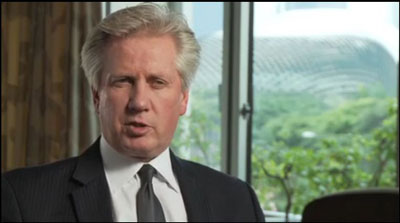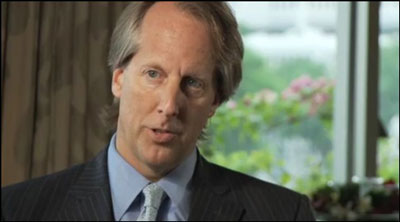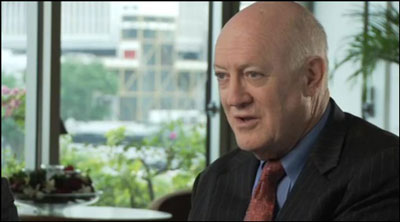 Brad White photo | |
 Rod Beckstrom photo |  Stephen Crocker photo |
Brad White: It's only been a few hours since the ICANN board meeting finished here in Singapore and I'd like to thank both of you gentlemen for taking the time to talk to us. Stephen Crocker, thank you very much as the new elected Board Chair. Rod Beckstrom, President and CEO. Steph, let's start with you. With your appointment as the new Chair and with this passage of this new gTLDs, what sort of new talent that lies ahead for you?
Stephen Crocker: This is a very big operation and also I'm now in an uncomfortable position to hang on for their life as a Board. The real challenge is for the organization as a whole to execute and moving this new gTLD program forward as well as carrying on real day-to-day business. And the affirmation and commitment. So it's a kind of triple. There will be both resource and execution challenges for the well defined parts of the program. And there will be anticipated problems or advoc cases or new sense that have dealt with certain amount of refinement that will be post to us while we are trying to get on with the main work.Brad White: I'm hearing you say that the Board's work with the new gTLD is not finished.
Stephen Crocker: In the main, you know we've set the course but I think it would be.. I don't want to make a big deal with it but there's always something to come up with. We're not gonna go to sleep and say you know we're done and it's all over. And imagine we're gonna be pretty embroiled in a continuing basis.Brad White: Rod, we've heard with the new phase with the Board's approval of the new gTLD program. The implementation phase is unkind ready.
Rod Beckstrom: Sure, you know we've built a next executive management team. We've been preparing for this moment for years as an organization. For two years, since I've been here, the programs are still under been development. Software systems, management teams, still a lot of work to do and you know this tight schedule, we have additional things relay around this week such as support for TLD applicants from developing countries, the staff to support the process, the community, the Board resolving that quickly. As long as we keep it as we define it and don't start changing in expanding the scope.Brad White: Are you concerned about that?
Rod Beckstrom: Sure, the natural pressure from this community is always to reiterate, change and refine and so we have to resist that temptation while we execute the first round.Brad White: Is that or something else your single greatest fear in terms of implementing properly the new program?
Rod Beckstrom: Yes, it's actually yes. My greatest fear is of changing the spec or the pressure that add new things in I think we can handle what was approved by the Board on Monday, We can handle doing something for TLD applicants for developing countries if the Board and community come up with a very clear directions by the corp at the latest and then allows to go and execute it. But if there are all kinds of other deliberations that come in and lobbying to change things. It would put pressure on the date, not on the program so much but on the date of launch that is currently scheduled for January 12. And that's what we're committed.Brad White: So you want a clear road map?
Rod Beckstrom: Yes and the clear road map comes from sticking with the plans that have been approved to communities that aren't even worked on. There will be lots of other great ideas for the future. Let's consider those for subsequent rounds. All the focus now needs to be on execution and Steve said on resolving on issues that relate to the framework that's already approved as we go through the next set of details and steps ahead.Brad White: How many applications do you expect to receive if you're looking ahead when the application process opens on January 12, 2012?
Rod Beckstrom: We don't just speculate like that. As we stated, there are some websites out there say that there's 90 applicants that seems to be self identified and maybe there's a 120 candidates that we don't tally. We don't do that. Our job is to prepare to handle the applications in an orally and professional fashion to protect the security and stability of the realm of the internet.Brad White: Steve has the relationship between the ICANN Board and the GAC men we defined by the dialogue and debate that occurred over the gTLD issue.
Stephen Crocker: I would say it's certainly gotten improved and deeper in the sense that this is provided a very hefty substitute of opportunities. And experience interacting back and forth with each other and I'll be able to experience first hand that relationships are broad and deeper. And that there will be an easier communication and earlier involvement in whatever processes come up. So it's been a pretty positive and I'm pretty excited actually. In the past, there's really a shift with the GACs. It's been kinda isolated. Speaking personally, I feel a lot closer and more mediate. I can sense it.Brad White: Let me spin-off with that. When I talked to your predecessor Peter Dengate Thrush, and I asked him what single benefit it would have for you. Basically it could sum up in two words: flexibility and listening. Would you agree with Peter in terms of the importance of these two qualities.
Stephen Crocker: Well, absolutely I would start with the listening first and foremost. Flexibility? always. I would have third which is fall through execution. It's important to listen. It's important to have flexibility. And it's also very important to follow through on the commitments and build the trust that comes from getting things done and success than just a lot of talk and mastery.Brad White: Rod just talked about the importance of clarity, about the importance of direction, and singularity of understanding of those elements. Is that of equal concern for you?
Stephen Crocker: Certainly yes, the Board is in the position of being in the center of all petitioning. People come out as individually, they come out as part of the organization, they come out as through the supporting organizations of large communities. The Board is obligated and has a very important role to listen as you said, to be respectful of those and at the same time stir course that is actually is not to cause fracturing and unrivaling. So a certain degree of firmness and support on decisions that have made. And a quickening of the pulse and the desire to get there. The time for endless discussion is over and at the same time a degree of sensitivity and balancing that is a real challenge and lot of that comes to the Board. There's no safe position. You keep a 100% where people say you're too rigid or too clumsy or whatsoever. The primary thing as just what Rod said is we have to have focus and direction and we have to have forward motion.Brad White: Rod, there was so much controversies surrounding dot triple x (.xxx). Does it concern you that we've opened a floodgates to even greater controversies on some of these new gTLDs that will be applied for?
Rod Beckstrom: Not really. Some people talk and suggest more blocking is gonna happen because of triple x. The reality is we read no other sources out there that grabs over 40 countries do. You know some level blocking and that trend is on the rise. That was happening irrespective of triple x. I don't know if there's been any material change in that position. In fact I'm kinda surprise after the Board approved triple x, things seem fairly quite at that front. I don't think it will change the program.Brad White: One of the continuing criticisms, that we hear from some analysts is that 185 thousand dollar application fee is in effect that cashcow for ICANN.
Rod Beckstrom: Look, we're a non-profit organization, we're community driven, serve the global public interest and this program is run on a cost-recovery only basis. And if there's any funds left in end of it, we'll go back to the community, and the Board and look how to handle that. It's all priced out to be break even.Brad White: The new gTLD program was approved this week at the meeting here in Singapore and yet the period of application doesn't begin until January 12. Why the long delay?
Rod Beckstrom: Because we really want to communicate around the world of the availability of this program. If you look at the ICANN community itself, most people that come here participates in our events, with through diverse stakeholders, our experts that have high level of knowledge of this program know what its doing. There's a lot of organization around the world, governments, corporations, NGOs, they really don't know much about it. So we have arrange a communications plan to go to all 5 regions of the world and communicate. And it certainly started a lot of interest to the issue.Brad White: There seems to be a great deal of confusion among the public between the generic top level domain and those who want a second level domain. Can you basically relay terms and explain the difference?
Stephen Crocker: Second level domains under any of the major top level domains are widely easily available at a real low cost and with very very little control. In a few minutes for a few dollars, you can apply for some domains. The top level domains, the ones that going to the route have been treated as a very very careful resources each one manage in a very high quality way. There's no concern globally or in a community if somebody has a second level domain and it stops working. That's their problem. There's enormous concern if a top-level domain stops working and under it all the second level domain that register in it stops working. So from a stability and security point of view, that is one of the major concerns. On the basis of that, part of the process and part of the cost in fact is make sure that the applicants are ready to run a first class top-level domain. They have the resources that protect their talent that they've organized and so forth. And that's one major aspect of all that. Non major aspect is that top level domains are viewed as global visibility. And that brings all the political and business forces such as trademarks, what are the names have any kind of meaning, there's emotional content associated with that for. In a more direct stability and security issues, confusability, there's bizarre to not have things cause similar, and cause users to misunderstand. All those things add to the complexity and qualitatively change even from a very narrow technical, "what's in it the top level or second level domain?", the mechanics are about the same. But there's an enormous difference on the perceptions and the treatment, and expectations that just leads to the quality of the different operation.Brad White: Steve, you just had an amazing career, you are considered one of the architects of the internet. Where would you place being elected as ICANN Board Chair in terms of those life experiences?
Rod Beckstrom: Let me just add, any consumer or small business organization can do a second level domain name registration. That's easy, you got little bit of money, you go online, use your credit card. The new gTLDs are not for consumers. You have to have very serious technical what we call registry operation. You have to be an ongoing business to commit a significant time, people and resources.
Stephen Crocker: You know what do you do after you become useless in this technical person in the office? So, No, it's just kidding aside. This is really quiet a joy in the sense that it's been a long ride. I look back over for more than 40 years from the time we put the first node on the internet and all of the developments and each one of the stages looks like it was huge compare to what it came before. And so there's that wealth of seeing that ark of events and knowing a lot of people and knowing the vast resource of people that I have been positively affected by all these developments. It's quiet exciting actually.Brad White: Rod, let me post the same question for you. You're well aware of Steve's background. Is it the combination of his experience that will take the board in any direction or is there single quality that you see that will vastly gonna fit him being a new Chair?
Rod Beckstrom: I think for one thing it's a great transition this time to occur. If you look at the last of couple of years since I came here. Enormous policy development work to be done on new gTLDs. Lot of intellectual property issues. And the previous chairman was a world class expert on that topic. If you look at where we're going now, as we discussed, draft applicant guidebook is approved. Now we need to go implement it but maintain the security and stability of the internet and you know Steve is a world class expert on that and his wealth of knowledge on that side, I mean I think it's a really good team. My strength is no leadership and execution and he's got the tremendous technology and security background. So I would just think that It's a pretty good match for what we are heading.Brad White: Gentlemen, thank you very much.
- https://www.affordablecebu.com/